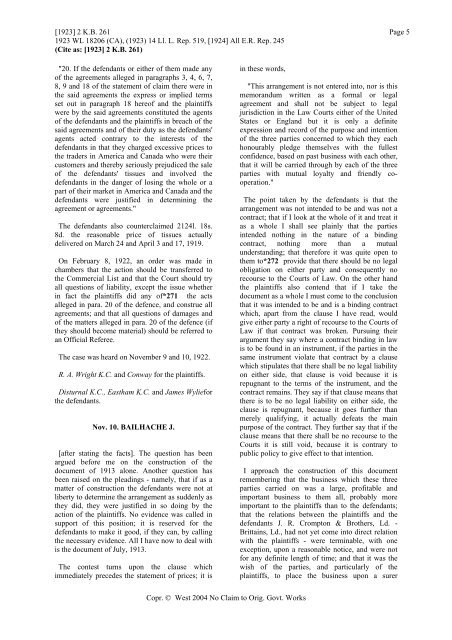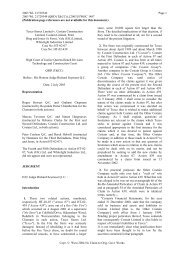Rose - Thomson Reuters
Rose - Thomson Reuters
Rose - Thomson Reuters
Create successful ePaper yourself
Turn your PDF publications into a flip-book with our unique Google optimized e-Paper software.
[1923] 2 K.B. 261 Page 51923 WL 18206 (CA), (1923) 14 Ll. L. Rep. 519, [1924] All E.R. Rep. 245(Cite as: [1923] 2 K.B. 261)"20. If the defendants or either of them made anyof the agreements alleged in paragraphs 3, 4, 6, 7,8, 9 and 18 of the statement of claim there were inthe said agreements the express or implied termsset out in paragraph 18 hereof and the plaintiffswere by the said agreements constituted the agentsof the defendants and the plaintiffs in breach of thesaid agreements and of their duty as the defendants'agents acted contrary to the interests of thedefendants in that they charged excessive prices tothe traders in America and Canada who were theircustomers and thereby seriously prejudiced the saleof the defendants' tissues and involved thedefendants in the danger of losing the whole or apart of their market in America and Canada and thedefendants were justified in determining theagreement or agreements."The defendants also counterclaimed 2124l. 18s.8d. the reasonable price of tissues actuallydelivered on March 24 and April 3 and 17, 1919.On February 8, 1922, an order was made inchambers that the action should be transferred tothe Commercial List and that the Court should tryall questions of liability, except the issue whetherin fact the plaintiffs did any of*271 the actsalleged in para. 20 of the defence, and construe allagreements; and that all questions of damages andof the matters alleged in para. 20 of the defence (ifthey should become material) should be referred toan Official Referee.The case was heard on November 9 and 10, 1922.R. A. Wright K.C. and Conway for the plaintiffs.Disturnal K.C., Eastham K.C. and James Wylieforthe defendants.Nov. 10. BAILHACHE J.[after stating the facts]. The question has beenargued before me on the construction of thedocument of 1913 alone. Another question hasbeen raised on the pleadings - namely, that if as amatter of construction the defendants were not atliberty to determine the arrangement as suddenly asthey did, they were justified in so doing by theaction of the plaintiffs. No evidence was called insupport of this position; it is reserved for thedefendants to make it good, if they can, by callingthe necessary evidence. All I have now to deal withis the document of July, 1913.The contest turns upon the clause whichimmediately precedes the statement of prices; it isin these words,"This arrangement is not entered into, nor is thismemorandum written as a formal or legalagreement and shall not be subject to legaljurisdiction in the Law Courts either of the UnitedStates or England but it is only a definiteexpression and record of the purpose and intentionof the three parties concerned to which they eachhonourably pledge themselves with the fullestconfidence, based on past business with each other,that it will be carried through by each of the threeparties with mutual loyalty and friendly cooperation."The point taken by the defendants is that thearrangement was not intended to be and was not acontract; that if I look at the whole of it and treat itas a whole I shall see plainly that the partiesintended nothing in the nature of a bindingcontract, nothing more than a mutualunderstanding; that therefore it was quite open tothem to*272 provide that there should be no legalobligation on either party and consequently norecourse to the Courts of Law. On the other handthe plaintiffs also contend that if I take thedocument as a whole I must come to the conclusionthat it was intended to be and is a binding contractwhich, apart from the clause I have read, wouldgive either party a right of recourse to the Courts ofLaw if that contract was broken. Pursuing theirargument they say where a contract binding in lawis to be found in an instrument, if the parties in thesame instrument violate that contract by a clausewhich stipulates that there shall be no legal liabilityon either side, that clause is void because it isrepugnant to the terms of the instrument, and thecontract remains. They say if that clause means thatthere is to be no legal liability on either side, theclause is repugnant, because it goes further thanmerely qualifying, it actually defeats the mainpurpose of the contract. They further say that if theclause means that there shall be no recourse to theCourts it is still void, because it is contrary topublic policy to give effect to that intention.I approach the construction of this documentremembering that the business which these threeparties carried on was a large, profitable andimportant business to them all, probably moreimportant to the plaintiffs than to the defendants;that the relations between the plaintiffs and thedefendants J. R. Crompton & Brothers, Ld. -Brittains, Ld., had not yet come into direct relationwith the plaintiffs - were terminable, with oneexception, upon a reasonable notice, and were notfor any definite length of time; and that it was thewish of the parties, and particularly of theplaintiffs, to place the business upon a surerCopr. © West 2004 No Claim to Orig. Govt. Works
















